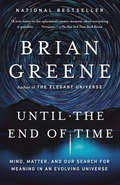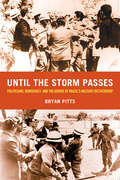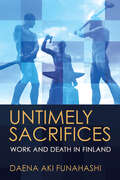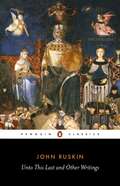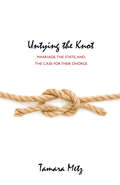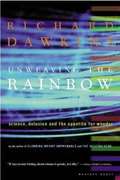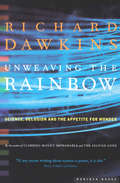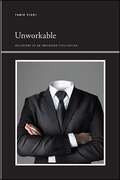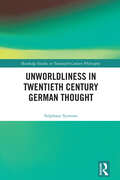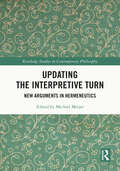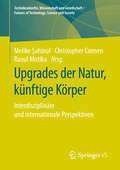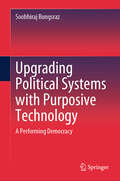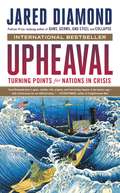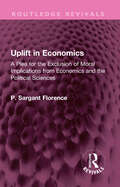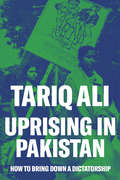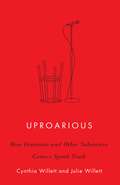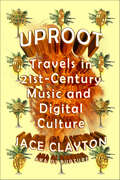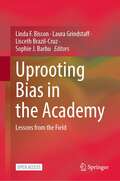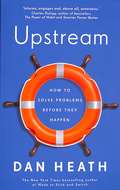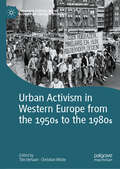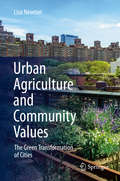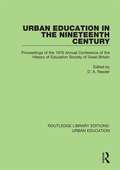- Table View
- List View
Until the End of Time: Mind, Matter, and Our Search for Meaning in an Evolving Universe
by Brian GreeneFrom the world-renowned physicist and best-selling author of The Elegant Universe comes this captivating exploration of deep time and humanity's search for purpose. <P><P>Until the End of Time is Brian Greene's breathtaking new exploration of the cosmos and our quest to understand it. Greene takes us on a journey across time, from our most refined understanding of the universe's beginning, to the closest science can take us to the very end. He explores how life and mind emerged from the initial chaos, and how our minds, in coming to understand their own impermanence, seek in different ways to give meaning to experience: in narrative, myth, religion, creative expression, science, the quest for truth, and our longing for the eternal. <P><P>Through a series of nested stories that explain distinct but interwoven layers of reality--from quantum mechanics to consciousness to black holes--Greene provides us with a clearer sense of how we came to be, a finer picture of where we are now, and a firmer understanding of where we are headed. With this grand tour of the universe, beginning to end, Brian Greene allows us all to grasp and appreciate our fleeting but utterly exquisite moment in the cosmos. <P><P><b>A New York Times Bestseller</b>
Until the Storm Passes: Politicians, Democracy, and the Demise of Brazil’s Military Dictatorship
by Bryan PittsA free open access ebook is available upon publication. Learn more at www.luminosoa.org.Until the Storm Passes reveals how Brazil's 1964–1985 military dictatorship contributed to its own demise by alienating the civilian political elites who initially helped bring it to power. Based on exhaustive research conducted in nearly twenty archives in five countries, as well as on oral histories with surviving politicians from the period, this book tells the surprising story of how the alternatingly self-interested and heroic resistance of the political class contributed decisively to Brazil's democratization. As they gradually turned against military rule, politicians began to embrace a political role for the masses that most of them would never have accepted in 1964, thus setting the stage for the breathtaking expansion of democracy that Brazil enjoyed over the next three decades.
Untimely Meditations
by Friedrich NietzscheThe four short works in Untimely Meditations were published by Nietzsche between 1873 and 1876. They deal with such broad topics as the relationship between popular and genuine culture, strategies for cultural reform, the task of philosophy, the nature of education, and the relationship between art, science and life. They also include Nietzsche's earliest statement of his own understanding of human selfhood as a process of endlessly â becoming who one is'. As Daniel Breazeale shows in his introduction to this new edition of R. J. Hollingdale's translation of the essays, these four early texts are key documents for understanding the development of Nietzsche's thought and clearly anticipate many of the themes of his later writings. Nietzsche himself always cherished his Untimely Meditations and believed that they provide valuable evidence of his â becoming and self-overcoming' and constitute a â public pledge' concerning his own distinctive task as a philosopher.
Untimely Sacrifices: Work and Death in Finland
by Daena Aki FunahashiUntimely Sacrifices questions why individuals may give their time and energy to the collective against their own self-interest. Turning to Finland where public health officials named occupational burnout as a "new hazard" of the new economy, Daena Funahashi asks: What moves people to work to the point of pathological stress?Contrary to health experts who highlight the importance of self-management and energetic conservation, Funahashi questions the very economic premise of cognitive psychology that one could "economize" one's energy and thus save oneself. By pitting anthropological takes on sacrifice next to the clinical discourses on pressure, work, and coping, Funahashi offers ways to rethink what drives stress.Untimely Sacrifices also provides a compelling critique of state welfare and political economy, contesting the tendency to treat the gift economy as something separate from the force that makes redistributive mechanisms of state welfare work. It is a book essential to those interested in how forces unassimilable to conventional economy come to matter in issues of labor, stress, and welfare.
Unto This Last and Other Writings
by John RuskinFirst and foremost an outcry against injustice and inhumanity, Unto this Last is also a closely argued assault on the science of political economy, which dominated the Victorian period. Ruskin was a profoundly conservative man who looked back to the Middle Ages as a Utopia, yet his ideas had a considerable influence on the British socialist movement. And in making his powerful moral and aesthetic case against the dangers of unhindered industrialization he was strangely prophetic. This volume shows the astounding range and depth of Ruskin's work, and in an illuminating introduction the editor reveals the consistency of Ruskin's philosophy and his adamant belief that questions of economics, art and science could not be separated from questions of morality. In Ruskin's words, 'There is no Wealth but Life.'
Untying the Knot: Marriage, the State, and the Case for Their Divorce
by Tamara MetzMarriage is at the center of one of today's fiercest political debates. Activists argue about how to define it, judges and legislators decide who should benefit from it, and scholars consider how the state should protect those who are denied it. Few, however, ask whether the state should have anything to do with marriage in the first place. In Untying the Knot, Tamara Metz addresses this crucial question, making a powerful argument that marriage, like religion, should be separated from the state. Rather than defining or conferring marriage, or relying on it to achieve legitimate public welfare goals, the state should create a narrow legal status that supports all intimate caregiving unions. Marriage itself should be bestowed by those best suited to give it the necessary ethical authority--religious groups and other kinds of communities. Divorcing the state from marriage is dictated by nothing less than basic commitments to freedom and equality. Tracing confusions about marriage to tensions at the heart of liberalism, Untying the Knot clarifies today's debates about marriage by identifying and explaining assumptions hidden in widely held positions and common practices. It shows that, as long as marriage and the state are linked, marriage will be a threat to liberalism and the state will be a threat to marriage. An important and timely rethinking of the relationship between marriage and the state, Untying the Knot will interest political theorists, legal scholars, policymakers, sociologists, and anyone else who cares about the fate of marriage or liberalism.
Unweaving the Rainbow: Science, Delusion and the Appetite for Wonder
by Richard DawkinsDid Newton "Unweave The Rainbow" by reducing it to its prismatic colors, as Keats contended? Did he, in other words, diminish beauty? Far from it, says acclaimed scientist Richard Dawkins. Newton's unweaving is the key to much of modern astronomy and to the breathtaking poetry of modern cosmology. Mysteries don't lose their poetry because they are solved: the solution often is more beautiful than the puzzle, uncovering deeper mysteries. With the wit, insight, and spellbinding prose that have made him a best-selling author, Dawkins takes up the most important and compelling topics in modern science, from astronomy and genetics to language and virtual reality, combining them in a landmark statement of the human appetite for wonder. This is the book Richard Dawkins was meant to write: a brilliant assessment of what science is (and isn't), a tribute to science not because it is useful but because it is uplifting.
Unweaving the Rainbow: Science, Delusion and the Appetite for Wonder (Penguin Press Science Ser.)
by Richard DawkinsFrom the New York Times–bestselling author of Science in the Soul. &“If any recent writing about science is poetic, it is this&” (The Wall Street Journal). Did Sir Isaac Newton &“unweave the rainbow&” by reducing it to its prismatic colors, as John Keats contended? Did he, in other words, diminish beauty? Far from it, says acclaimed scientist Richard Dawkins; Newton&’s unweaving is the key too much of modern astronomy and to the breathtaking poetry of modern cosmology. Mysteries don&’t lose their poetry because they are solved: the solution often is more beautiful than the puzzle, uncovering deeper mysteries. With the wit, insight, and spellbinding prose that have made him a bestselling author, Dawkins takes up the most important and compelling topics in modern science, from astronomy and genetics to language and virtual reality, combining them in a landmark statement of the human appetite for wonder. This is the book Dawkins was meant to write: A brilliant assessment of what science is (and isn&’t), a tribute to science not because it is useful but because it is uplifting. &“A love letter to science, an attempt to counter the perception that science is cold and devoid of aesthetic sensibility . . . Rich with metaphor, passionate arguments, wry humor, colorful examples, and unexpected connections, Dawkins&’ prose can be mesmerizing.&” —San Francisco Chronicle &“Brilliance and wit.&” —The New Yorker
Unworkable: Delusions of an Imploding Civilization (SUNY series, Insinuations: Philosophy, Psychoanalysis, Literature)
by Fabio VighiUnworkable discusses the ongoing implosion of our globalized world from three distinct angles: the capitalist elimination of labor through technological automation, the dissolution of our shared social narratives, and the subtle imposition of an increasingly pervasive ideological order. Aiming to root out the lost cause of this implosion, Fabio Vighi returns to Marx by way of Hegel, Lacan, Gorz, Baudrillard, and other thinkers who, in different ways, have reflected on the complex dialectical structure of modernity and its hidden conditions of possibility. Capitalism, Vighi argues, fundamentally redefined the meaning of work and prevented the emergence of alternative forms of life. In our own time, the delusions of work and the values that propel life under capitalism have become, in Vighi's analysis, unworkable. And yet, even as we become an increasingly "workless" society, we continue to abide by the same laws of productivity and profit.
Unworldliness in Twentieth Century German Thought (Routledge Studies in Twentieth-Century Philosophy)
by Stéphane SymonsWhat happens when the world around us feels fragmented? How can a person continue to respond positively to their environment when it seems to have lost its internal coherence? These questions lie at the heart of this innovative interpretation of some of the most influential German philosophers of the twentieth century. The key figures in this study are the young Georg Lukács (1885–1971), Ernst Jünger (1895–1998), Ernst Bloch (1885–1977), Theodor Adorno (1903–1969), Max Kommerell (1902–1944), and Siegfried Kracauer (1889–1966).By establishing an intellectual dialogue among these otherwise diverse thinkers, this study identifies a common interest: the question whether an unworldly, fragmented universe can nonetheless elicit a creative response from individuals. Together, these authors offer an alternative to what is considered the dominant trend in twentieth-century German philosophy: the phenomenological emphasis on humans' lived interactions with a shared and unified lifeworld. Special attention is given to six distinct interpretations of Miguel de Cervantes's novel Don Quixote and the unworldly actions of its main character.Unworldliness in Twentieth Century German Thought will appeal to researchers and advanced students interested in twentieth-century continental philosophy, German intellectual history, critical theory, and literature and philosophy.
Updating the Interpretive Turn: New Arguments in Hermeneutics (Routledge Studies in Contemporary Philosophy)
by Michiel MeijerThis collection of essays explores the meaning of the interpretive turn in the philosophy of the human sciences for a variety of contemporary philosophical debates. While hermeneutics seems to be firmly established as a tradition and methodology in the human sciences, interpretive philosophy seems to be under increasing pressure in recent philosophical trends such as the "posthuman turn," the "nonhuman turn," and the "speculative turn." Responding to this predicament, this book shows how hermeneutics is gaining new force and fresh applications today by bringing together a group of leading interpretive philosophers to address such timely topics as the entanglement of social science, culture, and politics in liberal capitalist societies, the extremism with which some identities are held within those societies, the possibility of genuine, non-relativist dialogue in a "post-truth" era, the nature of the strong moral judgments people tend to make in that era, the significance of interpretation for understanding nonhuman life forms, and the inherently hermeneutic dimension of such practices as work and productive action, testimony and witnessing, and measurement in scientific practice. Updating the Interpretive Turn will be of interest to researchers working in critical social science, social philosophy, ethical theory, environmental philosophy, philosophy of work, philosophy of testimony, philosophy of measurement, and philosophical hermeneutics itself.
Updating the Interpretive Turn: New Arguments in Hermeneutics (Routledge Studies in Contemporary Philosophy)
by Michiel MeijerThis book explores the meaning of the interpretive turn in the philosophy of the human sciences for a variety of contemporary philosophical debates.While hermeneutics seems to be firmly established as a tradition and methodology in the human sciences, interpretive philosophy seems to be under increasing pressure in recent philosophical trends such as the "posthuman turn," the "nonhuman turn," and the "speculative turn." Responding to this predicament, this book shows how hermeneutics is gaining new force and fresh applications today by bringing together a group of leading interpretive philosophers to address such timely topics as the entanglement of social science, culture, and politics in liberal capitalist societies, the extremism with which some identities are held within those societies, the possibility of genuine, non-relativist dialogue in a "post-truth" era, the nature of the strong moral judgments people tend to make in that era, the significance of interpretation for understanding nonhuman life forms, and the inherently hermeneutic dimension of such practices as work and productive action, testimony and witnessing, and measurement in scientific practice.Updating the Interpretive Turn will be of interest to researchers working in critical social science, social philosophy, ethical theory, environmental philosophy, philosophy of work, philosophy of testimony, philosophy of measurement, and philosophical hermeneutics itself.
Upgrades der Natur, künftige Körper: Interdisziplinäre und internationale Perspektiven (Technikzukünfte, Wissenschaft und Gesellschaft / Futures of Technology, Science and Society)
by Raoul Motika Melike Şahinol Christopher CoenenZu Beginn des 21. Jahrhunderts verändert sich durch Entdeckungen und Entwicklungen in Feldern wie den Neurotechnologien und der Hirnforschung, der Gentechnik und synthetischen Biologie, der Prothetik und den Nanotechnologien auch unser Verständnis der Natur und des Menschseins. Vor diesem Hintergrund ist es das Ziel des Sammelbands, Perspektiven aus dem deutschsprachigen Raum mit ausgewählten europäischen Positionen in einem interdisziplinären Austausch zusammenzuführen. Zugleich soll, was bisher eher selten der Fall war, ein Brückenschlag zwischen empirischer Forschung zu Körpermodifikationspraktiken und theoretischer Reflektion geleistet werden.
Upgrading Political Systems with Purposive Technology: A Performing Democracy
by Soobhiraj BungsrazThis book presents a framework for designing and implementing technologies to reduce risks in parliamentary decision-making, leading to the emergence of e-politics. It emphasizes adaptable virtual systems and problem-solving over predefined solutions, fostering multi-helix engagement among cross-functional teams. These teams collaborate to develop strategic, tactical, and operational solutions for citizens, elected parliamentarians, and organizations such as the UN. The book underscores the importance of risk identification, mitigation, and communication for e-political system safety. The framework leverages technology to create an e-democracy, enhancing the productivity of parliamentarians and promoting democratic sustainability. It builds on the theoretical framework of system engineering, aiming to avoid the pitfalls of previous generations' promises and instead focusing on continuous improvement through a people-centric system. The book introduces the PI App as a purposive technology that aids in implementing these ideas. By promoting an ever-improving parliament and parliamentarians, the framework aims to achieve higher productivity in decision-making roles and evolve practical e-democracy. It highlights the need for a Virtuous Cycle for continuous improvement in strategic decisions for national investment, ultimately leading to a people-centric system. The book envisions a future where technology plays a crucial role in ensuring democratic sustainability and enhancing the effectiveness of parliamentary decision-making.
Upheaval: Turning Points for Nations in Crisis
by Jared DiamondA "riveting and illuminating" (Yuval Noah Harari) new theory of how and why some nations recover from trauma and others don't, by the Pulitzer-Prize-winning author of the landmark bestsellers Guns, Germs, and Steel and Collapse. In his international bestsellers Guns, Germs and Steel and Collapse, Jared Diamond transformed our understanding of what makes civilizations rise and fall. <P><P>Now, in his third book in this monumental trilogy, he reveals how successful nations recover from crises while adopting selective changes -- a coping mechanism more commonly associated with individuals recovering from personal crises. <P><P>Diamond compares how six countries have survived recent upheavals -- ranging from the forced opening of Japan by U.S. Commodore Perry's fleet, to the Soviet Union's attack on Finland, to a murderous coup or countercoup in Chile and Indonesia, to the transformations of Germany and Austria after World War Two. <P><P>Because Diamond has lived and spoken the language in five of these six countries, he can present gut-wrenching histories experienced firsthand. These nations coped, to varying degrees, through mechanisms such as acknowledgment of responsibility, painfully honest self-appraisal, and learning from models of other nations. Looking to the future, Diamond examines whether the United States, Japan, and the whole world are successfully coping with the grave crises they currently face. Can we learn from lessons of the past? <P><P>Adding a psychological dimension to the in-depth history, geography, biology, and anthropology that mark all of Diamond's books, Upheaval reveals factors influencing how both whole nations and individual people can respond to big challenges. The result is a book epic in scope, but also his most personal book yet. <P><b>A New York Times Bestseller</b>
Upheavals of Thought
by Martha C. NussbaumWhat is it to grieve for the death of a parent? More literary and experiential than other philosopical works on emotion, Upheavals of Thought will engage the reader who has ever stopped to ask that question. Emotions such as grief, fear, anger and love seem to be alien forces that disturb our thoughts and plans. Yet they also embody some of our deepest thoughts--about the importance of the people we love, about the vulnerability of our bodies and our plans to events beyond our control. In this wide-ranging book, based on her Gifford Lectures, philosopher Martha Nussbaum draws on philosophy, psychology, anthropology, music and literature to illuminate the role emotions play in our thoughts about important goals. Starting with an account of her own mother's death, she argues that emotions are intelligent appraisals of a world that we do not control, in the light of our own most significant goals and plans. She then investigates the implications of this idea for normative issues, analyzing the role of compassion in private and public reasoning and the attempts of authors both philosophical and literary to purify or reform the emotion of erotic love. Ultimately, she illuminates the structure of emotions and argues that once we understand the complex intelligence of emotions we will also have new reasons to value works of literature as sources of ethical education. Martha C. Nussbaum is Ernst Freund Distinguished Service Professor of Law and Ethics, University of Chicago, appointed in Law School, Philosophy department, and Divinity School, and an Associate in Classics. A leading scholar in ancient Greek ethics, aesthetics and literature, her previous books include The Fragility of Goodness (Cambridge, 1986), Loves's Knowledge (Oxford, 1992), Poetic Justice (Beacon Press, 1997), The Therapy of Desire (Princeton, 1996), Cultivating Humanity (Harvard, 1997), and Sex and Social Justice (Oxford, 1999). Her reviews have appeared in the New York Times, Boston Globe, New York Review of Books, and New Republic.
Uplift in Economics: A Plea for the Exclusion of Moral Implications from Economics and the Political Sciences (Routledge Revivals)
by Philip Sargant FlorenceFirst published in 1929, Uplift in Economics is a self-proclaimed propaganda against the influence of moral judgement in social science research. The author argues that while the development of mankind is an honourable goal of economics and political science, the understanding and the execution of such development should not be marred by the moral beliefs of the researcher. Instead, priority should be given to scientific temper and empirical facts while carrying out any research. Over the years, the binary of reason and feeling has been replaced with a negotiation of the two; however, it is interesting to study the treatment of this debate at various points in history. This book will be of interest to students of economics, political science, psychology, philosophy and history.
Uprising in Pakistan: How to Bring Down a Dictatorship
by Tariq AliPakistan 1968: the history of a revolutionThe story of what happened in 1968 in Pakistan is often forgotten, but is proof of a global revolutionary moment. In that year, following years of tumult, a radical coalition - led by Zulfikar Ali Bhutto - brought down the military presidency of Ayub Khan. Students took on the state apparatus of a corrupt and decaying military dictatorship backed by the US. They were joined by workers, lawyers, white-collar employees, and despite the severe repression, they took hold of power. Through a series of strikes, demonstrations and political organising a popular uprising was born.In his riveting account of these events, Tariq Ali offers an eye witness perspective to history, showing that this powerful popular movement was one of the most revolutionary moments of the twentieth century. The victory led to the very first elections in the country, and the birth of a modern nation.
Uproarious: How Feminists and Other Subversive Comics Speak Truth
by Cynthia Willett Julie WillettA radical new approach to humor, where traditional targets become its agents Humor is often dismissed as cruel ridicule or harmless fun. But what if laughter is a vital force to channel rage against patriarchy, Islamophobia, or mass incarceration? To create moments of empathy and dialogue between Black Lives Matter and the police? These and other such questions are at the heart of this powerful reassessment of humor. Placing theorists in conversation with comedians, Uproarious offers a full-frontal approach to the very foundation of comedy and its profound political impact. Here Cynthia Willett and Julie Willett address the four major theories of humor—superiority, relief, incongruity, and social play—through the lens of feminist and game-changing comics such as Wanda Sykes, Margaret Cho, Hannah Gadsby, Hari Kondabolu, and Tig Notaro. They take a radical and holistic approach to the understanding of humor, particularly of humor deployed by those from groups long relegated to the margins, and propose a powerful new understanding of humor as a force that can engender politically progressive social movements. Drawing on a range of cross-disciplinary sources, from philosophies and histories of humor to the psychology and physiology of laughter to animal studies, Uproarious offers a richer understanding of the political and cathartic potential of humor. A major new contribution to a wider dialogue on comedy, Uproarious grounds for us explorations of outsider humor and our golden age of feminist comics—showing that when women, prisoners, even animals, laugh back, comedy along with belly laughs forge new identities and alter the political climate.
Uproot: Travels in 21st-Century Music and Digital Culture
by Jace Clayton“A meditation on how sounds are made, circulated and used by people around the world.” —GuardianIn 2001, Jace Clayton was an amateur DJ who recorded a three-turntable, sixty-minute mix called Gold Teeth Thief and put it online to share with his friends. Within months, the mix became an international calling card, whisking Clayton away to a sprawling, multitiered nightclub in Zagreb, a tiny gallery in Osaka, a former brothel in São Paolo, and the atrium of MoMA. And just as the music world made its fitful, uncertain transition from analog to digital, Clayton found himself on the front lines of an education in the creative upheavals of art production in the twenty-first-century globalized world.Uproot is a guided tour of this newly opened cultural space, mapped with both his own experiences and his relationships with other industry game-changers such as M.I.A. and Pirate Bay. With humor, insight, and expertise, Clayton illuminates the connections between a Congolese hotel band and the indie rock scene, Mexican surfers and Israeli techno, Japanese record collectors and hidden rain-forest treasure, and offers an unparalleled understanding of music in a digital age. Uproot takes readers behind the turntable decks to tell a story that only a DJ—and writer—of this caliber can tell.
Uprooting Bias in the Academy: Lessons from the Field
by Laura Grindstaff Linda F. Bisson Lisceth Brazil-Cruz Sophie J. BarbuThis open access book analyzes barriers to inclusion in academia and details ways to create a more diverse, inclusive environment. It describes the implementation of UC Davis ADVANCE, a grant program funded by the National Science Foundation, to increase the hiring and retention of underrepresented scholars in the STEM fields (science, technology, engineering and mathematics) and foster a culture of inclusion for all faculty. It first describes what the barriers to inclusion are and how they function within the broader society. A key focus here is the concept of implicit bias: what it is, how it develops, and the importance of training organizational members to recognize and challenge it. It then discusses the limitations of data collection that is guided by the convention assumption that being diverse automatically means being inclusive. Lastly, it highlights the importance of creating a collaborative, interdisciplinary, and institution-wide vision of an inclusive community.
Upstream: How To Solve Problems Before They Happen
by Dan HeathThis book delivers practical solutions for preventing problems rather than reacting to them. How many problems in our lives and in society are we tolerating simply because we’ve forgotten that we can fix them?
Urban Activism in Western Europe from the 1950s to the 1980s (Palgrave Studies in the History of Social Movements)
by Christian Wicke Tim VerlaanBringing together contributions from social, political, and urban historians, this collection examines social movements in Western European cities from the 1950s to the 1980s. Since their post-war recovery and reconstruction, cities in this part of the world underwent far-reaching societal transitions such as deindustrialisation and the rise of the service economy, the expansion and decline of local welfare regimes, suburbanisation and urban redevelopment, and the democratisation of urban politics. Indeed, the sources for urban activism have been manifold and the rehistoricization of this era through an urban lens is therefore valuable. The authors of this volume seek to provide a comprehensive and multifaceted understanding of how structural socio-economic, political, and cultural changes; ideological shifts; and urban spaces were intertwined in various place-dependent ways. By doing so, they offer fresh comparative and conceptual perspectives on urban activism. The book focuses on the ‘long 1970s’ – a structural break in time across the industrial West, which corresponded with the emergence of new social movements and an urban crisis that left a wasteland of abandoned factories, dilapidated workers’ housing, and stalling redevelopment schemes in its wake. Addressing how the post-industrial revolution socially, ideologically, and physically manifested itself in the urban environment, this book provides useful insights for colleagues in the fields of urban history, social history, political history, and social movement studies.
Urban Agriculture and Community Values: The Green Transformation of Cities
by Lisa NewtonThis book addresses the evolving crisis in agriculture and sketches the 'community economy' that grounds agricultural enterprise more accurately than the industrial model. In its current practice, agriculture is (in the United States but increasingly in the rest of the world) unsustainable and destructive. The most immediately unsustainable feature of industrial agriculture is its dependence on the products of petroleum—as feedstock for fertilizers, herbicides, and pesticides, and as fuel for the farm machinery and transport of agricultural products into the cities. The problems of agriculture and in general the food systems to which it is attached range from the vulnerability of monocultures to new and stronger pests to the emerging medical problem of obesity. The need for agricultural reform is widely acknowledged; one part of the new work being done suggests that food production in the cities may solve several of its problems at once. This book is suitable for both undergraduate and graduate students in agriculture and environmental studies.
Urban Education in the 19th Century: Proceedings of the 1976 Annual Conference of the History of Education Society of Great Britain (Routledge Library Editions: Urban Education #3)
by D. A. ReederFirst published in 1977, Urban Education in the 19th Century is a collection based on the conference papers of the annual 1976 conference for the History of Education Society. The book illustrates a variety of ways of elucidating the connections between education and the city, mainly in nineteenth-century Britain. Essays cover political, geographical, demographic and socio-structural aspects of urbanization. There is an emphasis on comparative studies of urban educational developments and attention is paid to the perceptions of the nineteenth-century city and its problems, especially for child life, as well as to the realities of urban change
